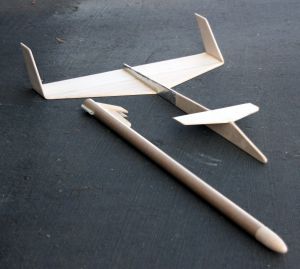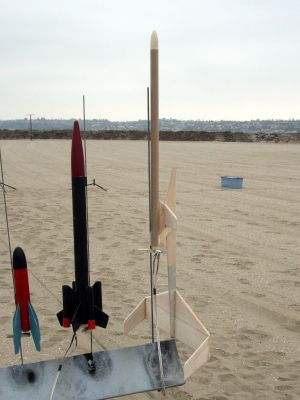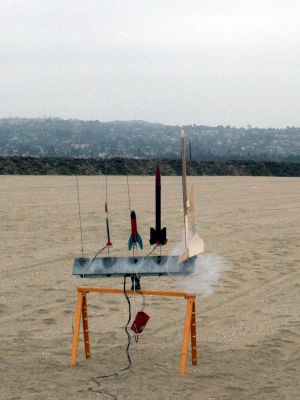Edmonds Aerospace DeeCee Thunder
Edmonds Aerospace - DeeCee Thunder {Kit}
Contributed by Todd Mullin
| Construction Rating: | starstarstarstarstar_border |
| Flight Rating: | starstarstarstarstar_border |
| Overall Rating: | starstarstarstarstar_border |
| Manufacturer: | Edmonds Aerospace |

Brief:
The DeeCee Thunder member of the Edmonds "Thunder" series of large gliders. This rocket features a canard
(rear wing) glider with a pop-pod.
Construction:
The DeeCee Thunder's components are:
- Several 1/4" thick sheets of laser cut balsa parts
- 1 BT-50 Body tube
- 1 BNC-50 Balsa nose cone
- 1 3/16" Launch lug
- 1 Aerospace Specialty Products 12" parachute kit
- 1 1/4" Elastic shock cord
- 1 Instruction Booklet

All of the necessary parts for the kit were present and accounted for when I opened the poly bag that they came packaged in. The balsa was nice and firm with the laser parts being well cut without too much scorching on the edges.
The only component that I was concerned about with the kit was the shock cord. The instructions say to trim it to about 18". The elastic I got with my kit was probably not even 12". I added about another 12" by tying on some Kevlar® cord that I had in my parts bin.
The instructions for the DeeCee Thunder are a total of three sides of the two 8.5" x 11" sheets of paper. The are generously illustrated to the point that the text is really almost unnecessary!
The first page is a diagram showing how to fit the six pieces of the glider together. Yes, you read that right. The glider only has six parts and they are all notched and tabbed to fit perfectly. If you are looking for a complex build, this rocket is not it! However, it is ideal for a rookie builder, child or just a quick, fun build! The only slight "gotcha" is something not mentioned in the instructions. The laser charred edges of the balsa should be sanded lightly to remove the char to promote good solid bonds between the parts. Not sanding could easily lead to the parts snapping apart as was mentioned in the previous review.
The construction of the pop-pod is nearly as simple as the glider. The glider hook is three balsa tabs that are stacked and glued together and then to the body tube. The instructions say to glue a strip of paper in between the layers to make sure the fit of the glider boom is loose between the tabs. I opted not to do this and just sanded the tabs a little.
Next the launch lug is glued on the body tube next to the glider hook. The parachute is next to be assembled. The shock cord is glued in with a standard three-fold anchor and a screw eye holds everything to the nose cone.

Finishing:
This kit flies fairly well built totally stock even with no sanding. There is a small girl who flies one at our
launch site that almost lost hers over the boundary of the flying field. It is about as unfinished as the kit can be!
I wanted to make a little better effort and see how performance could be increased. All of the edges of the glider were either rounded or tapered and the whole glider was sanded smooth. I filled the gaps and dings in the balsa with lightweight filler.
In reading the comments on this kit here on EMRR, I noticed one that said that there was a problem with the glider body suffering burns from the motor on boost. To avoid this problem, I wrapped the body in a wrap of aluminum foil, sealing it on with super glue.
As always with a glider, trimming is essential. This may sound complicated, but it's not really. Just hand toss the glider, adding small bits of the included clay weight to the nose or tail until the glide is nice and smooth! The kit could have been flown stock, but with a bit of effort, it was getting great glides even from a gentle toss!
Construction Rating: 4 out of 5

Flight:
We got to the flying field early that day of the launch to try and beat the wind. It was breezy but not too windy.
Unfortunately, the dealer who usually shows up to sell motors was at another launch so I only had one motor for the
DeeCee!
There is no motor retention or thrust ring so we friction fit the motor with a few wraps of masking tape and added a few more around the tail end of the motor to keep it from sliding up into the body tube at launch.
A quick pinch of cellulose wadding and a fold of the chute and we were off to the pads. The instructions recommend loading the pod onto the rod and then hanging the glider on it. This technique worked well and allowed us to adjust the clothes pin we were using as a stop to the correct height without dinging up the glider. We also used the clothes pin as an umbilical clip to hold the clips.
The DeeCee Thunder boosted nicely and reasonably straight. At ejection, the pod's shock cord got caught for a second on the glider but pulled free almost immediately and the chute unfurled.
Recovery:
The glider flew slow, lazy circles around the sky, almost hanging motionless as it turned into the wind and picking
up speed as it flew down wind. Not a competition class glider, but it turned in a respectable flight and didn't take
any landing damage.
The parachute is sized fairly well for the pod. Not too much drift and it came down slow enough to not sustain any landing damage.
I saw no evidence of scorching on the glider body so it looks like my aluminum foil insulation worked.
Flight Rating: 4 out of 5

Summary:
This rocket was primarily constructed by my 12-year old daughter for her 4H rocketry club. She has built only a few
almost ready to fly 3FNC kits but had no problem with this one with only minor supervision and coaching. We wanted
something that was a bit more fun to fly and this was definitely the ticket. Hopefully she'll have as much fun with her
rocket as I have had with my Edmonds kits.
I am a big fan of the Edmonds line of kits and have built several others. The DeeCee Thunder is not nearly as complex as its big brother, the Ecee Thunder or the Arcie II, but still gives the "ohs" and "ahs" from the people on the flight line when a big glider boosts off the pad.
I was somewhat surprised by the previous review of this kit. We had none of the problems that the previous reviewer did so I felt that I should post a second review as a counter balance for what I think is a fairly sturdy, well designed kit. The only thing I didn't like about the kit was the shock cord, which was very short and only about half the length it should have been but this was easily fixed.
Overall Rating: 4 out of 5
Other Reviews
- Edmonds Aerospace DeeCee Thunder By Eddy Pula
Brief: Boost-Glider with booster parachute. Construction: A 26 in tube with a glider and no fins. 22 in shock cord. Mine did not come with a nose cone so I used a Estes Alpha 3. The Booster and glider instructions were brief but easy to follow. Easy construction. The glider is very fragile, maybe it was just my stupidness but it broke twice during transportation. Finishing: ...
 |
 |
Flights
 |
 |
H.W.H. (March 25, 2007)
Sponsored Ads
 |
 |










M.K.W. (July 2, 2005)